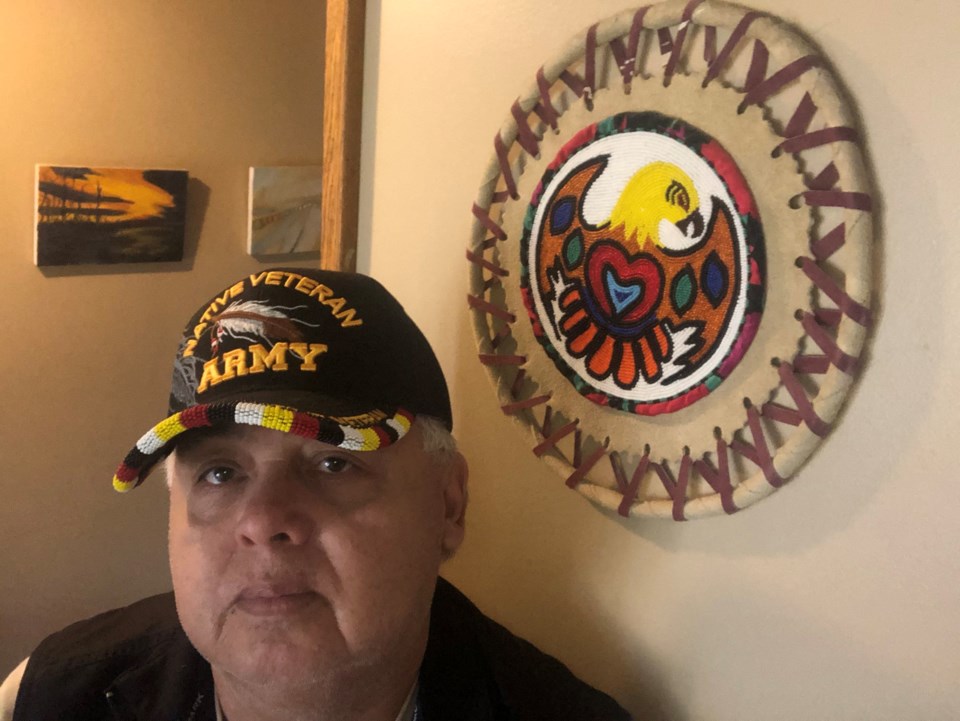First Nations fighting to decolonize Remembrance Day

Veteran Jeff Monague is among those who are trying to decolonize remembrance services in an attempt to preserve First Nations culture and nationhood. Contributed photo.
From Orillia Matters, November 8, 2021
By
Indigenous culture and nationhood is like a fire that’s not so easy to extinguish, says local elder of ‘evolutionary’ attempts to decolonize the Canadian military
Today (Nov. 8) is National Indigenous Veterans Day and First Nations across the country will observe the day by singing O Canada, playing the Last Post, observing two minutes of silence, reciting the Act of Remembrance and placing wreaths at cenotaphs.
Many First Nations will also begin their ceremonies of remembrance by smudging prior to the event, singing an Honour Song prior to the singing of O Canada, and saying prayers in their Indigenous languages.
This decolonization of remembrance services has been a gradual one for First Nations.
In my community, the Beausoleil First Nation on Christian Island, growing up in the 1960s and 70s, Remembrance Day services were few and far between.
This small village, like so many other First Nations in Canada, has a long history of volunteering to serve alongside Canadians. We have men and women who volunteered through the First and Second World Wars, the Korean War, the Gulf War, and Afghanistan. This service as allies to the Crown extends as far back as the War of 1812.
In that conflict, Chiefs Gnebig, Essens, and Yellowhead led a contingent of fighters from the Anishinaabeg Tri-Council from this region now called Simcoe County, to engage the Americans at Niagara. There, they assisted British and other allied Indigenous Nations in repelling an effort by the United States to annex the land which would eventually become known as Canada.
The allied Indigenous Nations remained separate entities before and after that conflict in 1812. They were regarded as treaty partners as treaties can only be nation to nation agreements.
In the First World War, there were Indigenous fighting forces from Brantford and Manitoba; a recognition of the nation to nation relationship that existed since the beginning of settlement by the European community into this land. It was again a recognition of the allyship that existed since 1812.
However, during the course of the First World War and the Second World War, Canada began integrating Indigenous fighters into the ranks of its own military units. This integration ensured uniformity, and conformity for the colonial army. That practice remains in place today.
The integration/assimilation meant that First Nation customs and protocols were not welcomed into the colonial system and were often disrespected outright. The idea of Indigenous men and women fighting as allies was smothered under the Queen’s Orders and Regulations, the doctrine of the Canadian military.
But, Indigenous culture and nationhood is like a fire that’s not so easy to extinguish.
First Nations breathed life back into their own customs and protocols somewhere in the 1990’s when the big drum and smudging ceremonies were brought into the services of Remembrance. Each year we honour those who have served as allies to the Crown and those who continue to serve today.
Families place poppies on wreaths and wreaths are laid. The names of the fallen are read aloud. Later, as the veterans gather, stories are told. Warriors and their exploits are remembered. Except for those that fell in 1812. There is no record of those warriors who fell at Niagara during that conflict. But, in Anishinaabe tradition, their names would not have ever been spoken again after their passing.
The decolonization of Remembrance Day is an evolutionary process and perhaps one day we will open the ceremony with a Grand Entry by our veterans and they will be joined by family members of those who have passed on and together they will bring honour to these warriors with a traditional dance onto the parade square.
I imagine that is the kind of ceremony that took place in 1812 for those who returned and those who did not return from Niagara. Not ever speaking the names of those who fell in 1812 was customary and we unknowingly carried that tradition onward into today.
It’s as if the ancestors meant for us to pick up our traditions and carry them proudly forward as we always had. That’s decolonization.
Jeff Monague is a former Chief of the Beausoleil First Nation on Christian Island, former Treaty Research Director with the Anishnabek (Union of Ontario Indians), and veteran of the Canadian Forces. Monague, who taught the Ojibwe language with the Simcoe County District School Board and Georgian College, is currently the Superintendent of Springwater Provincial Park. His column appears every other Monday.
Read the article here









Leave a Reply